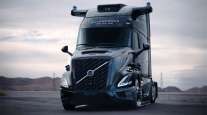Senior Reporter
Volvo Posts Record Quarterly Revenue in 2Q

[Stay on top of transportation news: Get TTNews in your inbox.]
Volvo Group posted higher net income in the second quarter on the strength of record sales and increased truck deliveries.
Also at a record were adjusted operating income for the quarter.
But truck orders weakened, and the company highlighted its recent early efforts to develop and deploy electric and autonomous vehicles.
For the period ended June 30, Volvo (reporting in Swedish krona) reported net income rose to the equivalent of $1.2 billion, or 58 cents per diluted share, compared with $990 million, or 48 cents.
Revenue in the quarter climbed to $13 billion compared with $11 billion a year earlier.
For the six-month period, net income jumped to $2.4 billion, or $1.14 billion, compared with $1.6 billion, or 78 cents, a year earlier. Revenue reached $24.3 billion compared with $20.6 billion in the 2018 period.
Income from truck sales in the quarter rose to $8.1 billion. That was up from $7 billion a year earlier. Through the first half, revenue from trucks jumped 19% to $15.4 billion compared with a year earlier.
“Increased vehicle volumes were the main contributor to the profit improvement,” including higher volumes of trucks, construction equipment and buses, CEO Martin Lundstedt said in a statement.

Lundstedt
Truck deliveries in the quarter climbed 10% to 65,237 compared with 59,571 a year earlier. For the six-month period, deliveries increased 11% to 123,831. That compared with 111,145 deliveries in the 2018 period.
In North America, deliveries during the quarter reached 19,010, up 35% compared with 14,114 a year earlier, and increased 38% in the six-month period to 36,215 compared with a year earlier.
Volvo’s North American brands are Volvo Trucks North America and Mack Trucks.
Adjusted operating income in the quarter hit $1.6 billion compared with $1.2 billion a year earlier.
Meanwhile, global truck orders came in at 47,821, or 21% lower compared to the 2018 quarter, including an expected low level in North America and with heavy-duty and medium-duty trucks in Europe declining 9%, Lundstedt said.
North American truck orders in the quarter fell 53% to 7,428 compared with 15,860 a year earlier. They were down 67% for the first six months.

Volvo Trucks North America
In the quarter, VTNA’s orders fell 64% to 3,974 compared with a year earlier; at Mack, they were down 26% to 3,434 in North America. Its UD and Renault brands, combined, sold 20 trucks in North America.
“Consequently, we will during the course of the second half of the year adapt our production,” Lundstedt said.
In the earnings report, Volvo highlighted its early efforts with electric trucks and autonomous vehicles.
During the quarter, Renault Trucks handed over the first fully-electric refuse truck to its customer, Lyon Metropole, in France. Volvo unveiled the Mack LR battery electric vehicle, which the New York City Department of Sanitation will begin testing in 2020.
The company also noted an important step in creating a viable electric platform is the strategic alliance which it entered into with Samsung SDI covering the joint development of battery packs for its trucks.
“The alliance with Samsung SDI is an important next step on our journey towards offering the world’s most truly sustainable transport system with fossil-free alternatives for our commercial vehicles,” Lundstedt said.
Other highlights mentioned included its electric, connected and autonomous vehicle called Vera, which will form part of an integrated solution to transport goods from a logistics center to a port terminal in Gothenburg, Sweden. The assignment is a result of a new collaboration between Volvo Trucks and logistics company DFDS.
Also, Volvo Group signed an agreement with NVIDIA to jointly develop the decision-making system of autonomous commercial vehicles and machines designed to safely handle fully autonomous driving on public roads and highways.




